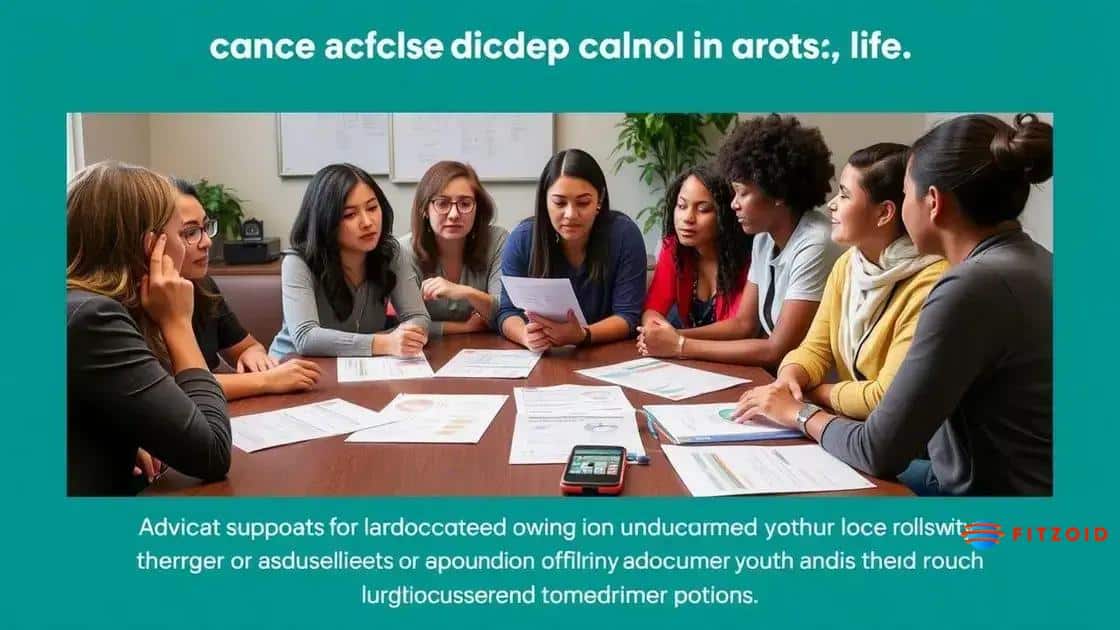Education access for undocumented children: breaking barriers

Anúncios
Education access for undocumented children is crucial, as it involves overcoming barriers like fear of deportation and lack of financial aid, while community support and advocacy play vital roles in ensuring these students receive quality education.
Education access for undocumented children is a pressing issue that affects many families today. How can we ensure that every child has the opportunity to learn and thrive? Let’s explore the barriers and solutions surrounding this critical topic.
Understanding the challenges faced by undocumented children
Understanding the challenges faced by undocumented children is crucial in today’s society. Many of these children encounter numerous obstacles that hinder their right to a proper education. Factors like legal issues, fear of deportation, and financial instability play significant roles in their everyday lives.
Anúncios
One of the main problems is the legal uncertainty. Many undocumented children do not have access to the same educational resources as their peers. This lack of support can lead to feelings of isolation and anxiety.
Financial limitations
Moreover, financial strain is an overwhelming issue. Families often struggle to provide basic needs, which affects a child’s ability to focus on schoolwork. This financial burden results in:
Anúncios
- Limited access to educational materials.
- Inability to participate in extracurricular activities.
- Higher dropout rates.
Another factor is the fear of being discovered. This fear can lead to stress and anxiety that impacts academic performance. Children may hesitate to seek help from teachers or counselors, feeling they might expose their status by doing so.
Social integration challenges
Social integration is also a significant concern. Many undocumented children feel a sense of alienation from their peers. This emotional struggle can impact their mental health. Establishing friendships and connections is vital for emotional well-being.
Even though these challenges are daunting, it’s essential to recognize the resilience of undocumented children. Many continue to strive for success despite the barriers they face. This spirit of perseverance shines through, highlighting the importance of community support and advocacy.
Understanding these challenges is the first step toward creating substantive change. Schools, communities, and policymakers need to work together to support undocumented children and ensure their access to education.
Recent policy changes impacting education access

Recent policy changes have significantly impacted education access for undocumented children. Understanding these changes is critical for realizing how they affect students and families. Various laws and regulations have emerged, aimed at either supporting or restricting access to educational opportunities.
A major change is the shift toward more inclusive policies in some states. For instance, several states have enacted laws allowing undocumented children to enroll in public schools without fear of backlash. This has led to increased enrollment and a better sense of community among undocumented students.
Increased funding for programs
In addition to enrollment policies, funding for educational programs that assist undocumented children has also increased. This funding helps bridge the gap created by lack of resources and support. Key benefits include:
- Enhanced access to language programs.
- Support for mental health services.
- Tutoring and scholarship opportunities.
On the other hand, there have been some restrictive changes. In some regions, policies have tightened, making it difficult for undocumented families to feel safe accessing education. Fear of deportation can prevent these children from attending school or seeking help.
The role of federal legislation
Moreover, federal legislation plays a crucial role in shaping local policies. The introduction of DACA (Deferred Action for Childhood Arrivals) provided some relief to undocumented youth, allowing them to pursue education and work without constant fear. However, the future of DACA remains uncertain, causing anxiety among many children and their families.
As communities respond to these policy changes, it’s vital to stay informed. Changes in local laws can significantly affect undocumented children and their educational journeys. Advocacy and support from various organizations and community members are essential to ensure that education access does not become a privilege but a right for all.
Community initiatives supporting undocumented youth
Community initiatives play a vital role in supporting the educational journey of undocumented youth. These programs often step in to provide the necessary resources and encouragement that these children may not receive from other sources. As communities recognize the challenges faced by undocumented students, efforts have been made to create supportive environments where they can thrive.
One example of these initiatives is mentorship programs. Community organizations often pair undocumented children with mentors who understand their unique situations. These mentors can provide guidance and support, helping children navigate both academic challenges and personal issues.
Educational workshops and resources
Many communities also offer workshops and resources tailored specifically for undocumented youth. These may include:
- Language classes to improve English skills.
- Financial literacy programs that teach budgeting and saving.
- College preparation courses, including assistance with applications and scholarships.
In addition to workshops, physical centers serve as safe spaces where undocumented youth can gather. These centers often provide homework help, tutoring, and a supportive community. The sense of belonging in these spaces is immensely beneficial.
Legal support services
Another essential aspect of community initiatives is legal support. Accessing quality legal advice can be challenging for undocumented families. Some organizations offer free or low-cost legal services to assist families in understanding their rights and options. These services can reduce the fear and anxiety around deportation, allowing children to focus on their education.
Partnerships with local schools are also crucial. Collaborations can lead to the creation of programs specifically designed to meet the needs of undocumented students. By working together, schools and community organizations can help create pathways to success.
Overall, community initiatives are crucial in ensuring that undocumented youth receive the support, education, and resources they need to succeed. By coming together, communities can help these children feel seen, valued, and empowered.
The role of advocacy in improving educational opportunities

The role of advocacy is crucial in improving educational opportunities for undocumented children. Advocacy involves raising awareness about the challenges these children face and pushing for policy changes that create a more inclusive education system. By advocating for the rights of undocumented students, communities can help ensure that every child has access to the education they deserve.
Many organizations focus on this important work. They employ various strategies to promote educational equity. These strategies include:
Public awareness campaigns
- Organizing events to educate the community about the needs of undocumented students.
- Creating informative materials that highlight success stories and challenges.
- Utilizing social media to reach a broader audience and share important messages.
Aside from awareness campaigns, legal advocacy also plays a significant role. Groups often work to influence legislation that affects undocumented children. They lobby for policies that:
- Ensure access to in-state tuition for undocumented students.
- Protect students from discrimination in schools.
- Support funding for programs specifically designed for these students.
Moreover, community advocacy brings families together to share their experiences. By creating networks of support, families can find strength in their numbers. This unity can lead to more significant pressure on lawmakers to enact changes that benefit undocumented youth.
Collaboration with educational institutions
Collaboration with schools is essential for effective advocacy. Educators can serve as allies in promoting an inclusive atmosphere. Training sessions for teachers and staff can raise awareness about the unique challenges faced by undocumented students. When teachers understand these issues, they can better support their students.
Advocacy is not just about pushing for changes; it’s about building a community where undocumented children feel valued and supported. As communities come together, they create an environment where education thrives for all, making a lasting impact on future generations.
Personal stories: experiences of undocumented students
Personal stories provide powerful insights into the experiences of undocumented students. These accounts highlight the struggles, triumphs, and resilience shown by individuals navigating the challenges of education without the security of legal status. Sharing these stories humanizes the issue and helps to foster understanding and support within communities.
One story that stands out is that of a young girl named Maria. After her family moved to the United States when she was just six years old, she quickly learned English and excelled in her classes. However, as she approached high school graduation, Maria faced the harsh reality of her status. Despite receiving acceptance letters from several colleges, she felt uncertain about her future due to her inability to apply for financial aid.
Overcoming barriers
Maria’s determination pushed her to seek scholarships specifically for undocumented students. With the support of counselors and community organizations, she was able to secure funding and attend her dream school. Her story is a testament to the power of perseverance and community support.
Similarly, other students share tales of navigating school while keeping their status a secret. Many live in fear of being discovered, which adds tremendous stress to their academic lives. This fear can impact their performance and mental health. Yet, through peer support networks, these students find empowerment and camaraderie that help them cope with their challenges.
Impact of community support
The role of community initiatives is evident in these stories. Many undocumented students are supported by local programs that provide tutoring, mentorship, and college readiness workshops. These resources not only improve academic performance but also build confidence and self-worth.
Each personal story emphasizes the need for advocacy and understanding. By listening to these experiences, communities can recognize the importance of creating environments where undocumented students can thrive. Fostering inclusivity in schools and providing necessary resources can lead to a brighter future for all students, regardless of their legal status.
FAQ – Common Questions about Education Access for Undocumented Children
What challenges do undocumented students face in education?
Undocumented students often encounter barriers such as fear of deportation, lack of access to financial aid, and limited support resources.
How can communities support undocumented youth?
Communities can support undocumented youth by offering mentorship programs, scholarships, and resources tailored to their unique needs.
What role does advocacy play in improving education access?
Advocacy raises awareness about the rights of undocumented students and pushes for policy changes to create a more inclusive education system.
How do personal stories help in understanding the issues faced by undocumented students?
Personal stories humanize the challenges of undocumented students, fostering empathy and encouraging community support for their educational journeys.





